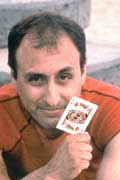Daisy was obsessed with Christmas. She loved everything about the holiday—the fragrant tree, shiny ornaments, twinkling lights, candy canes, the works. Just last week, her mother heard the seven-year-old belting out “Jingle Bell Rock” to an audience of dolls.
It was cute. It would have been adorable, but it was August in Pasadena. And the Blums were Jewish.
“Maybe she’ll grow out of it,” Jessica Blum said to her husband as they sipped their morning coffee.
“I blame myself,” said David. When Daisy was a baby, he hung a extra-strength pine air freshener near her changing table in an unsuccessful attempt to mask the eye-watering reek of dirty diapers.
“It could’ve been worse. If you had picked the Piña Colada fragrance, we’d have the only second-grader in A.A.,” she said. Both David and Jessica were only children. Neither had babysat as teenagers, so raising a child was an often-baffling undertaking.
Daisy shuffled into the kitchen barefoot and yawning. Her Dora the Explorer nightgown was creased from sleep and her wavy brown hair looked like it had been styled with a weed-whacker. She pulled a stool up to the kitchen counter and poured some cereal into her favorite bowl—a chipped piece of Christmas Spode purchased at a yard sale for a quarter.
Jessica poured the milk on her daughter’s cereal, admiring (and not for the first time) the way her engagement ring sparkled in the morning sun. It was not the ring she expected when David proposed nine years ago. They were both paying off student loans and dealing with necessary expenses like dependable cars and business attire.
She assumed that when the time came, they’d find a small, affordable ring at J.C. Penney and joke that a snack at Cinnabon was just as good as breakfast at Tiffany’s.
But David’s grandmother had other plans. She wanted her only grandson to have her engagement ring. “It was my mother’s. Let’s keep it in the family,” she’d said. That’s how Jessica wound up wearing a platinum filigree Edwardian solitaire that was very likely worth more than her car.
“What’s on your agenda today?” David asked his wife. He had to spend his Saturday at his company’s annual strategy meeting.
“Just quality time with the other men in my life,” she said with a grin. Her list included Bill (shoe repair), Mr. Tran (dry cleaner), Wyatt (bagels) and the nameless guy at Jiffy Lube with the Celtic tattoo and bedroom eyes.
“Momma, don’t forget the art store!,” yelped Daisy through a mouthful of Lucky Charms. The little girl’s reward for a day of errands was some new markers or colored pencils from Blick. Daisy worked cheap.
It was after four o’clock when the pair returned home with their boxes, bags, and library books. Jessica settled Daisy at the dining room table with her pink tackle box of art supplies, and went into the kitchen to put away the groceries.
She was thinking about dinner when suddenly the air left her lungs and the room started spinning. Her diamond. Her husband’s grandmother’s—no, great-grandmother’s—diamond was gone. The gaping hole in the ring was horrific, like a missing eyeball or a gunshot wound.
She thought about all the places she had been and tried to remember when she had last seen the diamond sparkle. Jessica must have made some sort of noise, because Daisy looked up from her work.
“What’s the matter, momma?”
“Nothing, baby. Just wishing Daddy was home.”
“Can we have Tater Tots?”
“Sure, sweetheart. Lots of tots.” Daisy grinned at her mother’s rhyme and returned to her drawing.
Knowing it was futile, Jessica walked through the house, looking into corners, shaking out towels, pawing through the laundry basket. Losing the diamond was bad enough, but the idea that it might be in a trash can at McDonald’s or kicked into a gutter was even worse.
When David walked in just before six o’clock, Jessica led him into their bedroom, explained what happened, and let herself cry for a few minutes.
“It was just an old rock,” said David when she stopped sobbing and blew her nose. “A big, pretty rock, but a rock all the same.”
“I know, but I feel like I let your grandmother down.”
“The only way you could have let her down was by not wearing it. We’ll get a new stone for your ring.”
“Yeah, if we start saving now, we might able to afford a diamond by the time Daisy is ready to get married,” said Jessica.
“That’s only if she skips college. Education is so overrated, anyway,” said David with a small smile.
The heat hadn’t let up, so Jessica ordered a pizza, David microwaved a side of Tator Tots, and the family sat down to eat. Daisy’s picture was posted on the refrigerator to keep it safe from tomato sauce and cheese grease.
After a little TV and some ice cream, Daisy was ready for bed. Forty minutes into a bad movie, David and Jessica decided to call it a day.
They made their usual small talk as they got ready for bed, but Jessica was just going through the motions. After she brushed her teeth, she checked every inch of the bathroom in case the diamond had fallen and bounced on the tile floor. She sighed, put her ring in her jewelry box, and flopped down next to David. He was already asleep.
After an hour of fidgeting, Jessica got out of bed and headed to the kitchen for a cold drink—and maybe some cold pizza. The light from the refrigerator illuminated Daisy’s latest masterpiece which was secured to the freezer door with two Hello Kitty magnets.
It was another Christmas tree, of course. This one had branches in three shades of green with silver glitter tinsel and crayon-colored lights. At the very top of the tree, partially covered in glue, was a nearly flawless 2 carat European-cut diamond.
© Copyright 2010 Paula Johnson. All rights reserved.
Paula Johnson is a copywriter and graphic designer who also writes and performs stand-up comedy and maintains The Rose City Sisters Flash Fiction Anthology. This is her fourth flash fiction story. Others are “Good with Names,” an account of life with a very modest superpower; “Better Late Than Never,” a soap opera love story; and “Lotion” a tale that could only happen in New Orleans.













